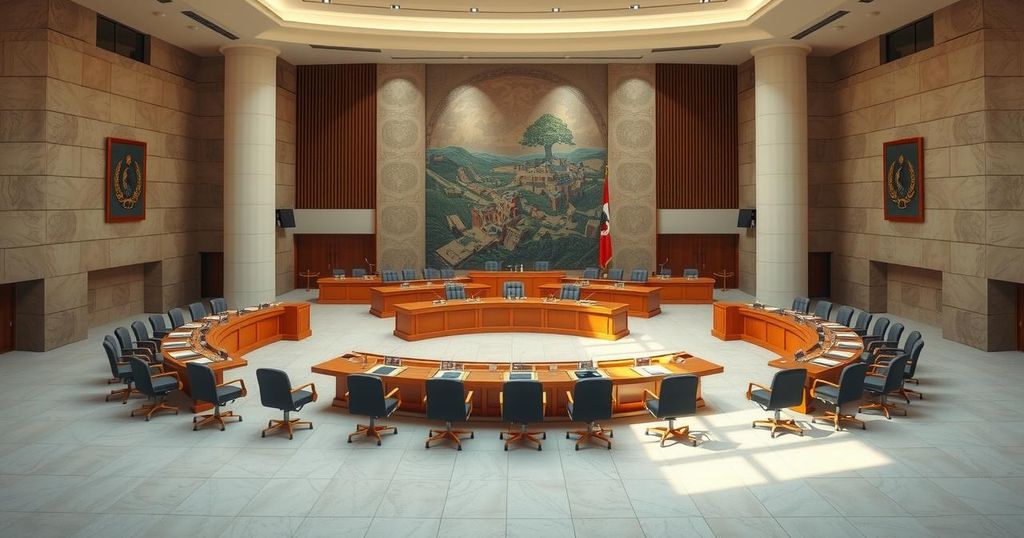Arab leaders have supported Egypt’s post-conflict reconstruction plan for Gaza, allowing Palestinians to remain, contrasting with Trump’s proposal to depopulate the area. The $53 billion initiative aims for Gaza’s recovery by 2030. The summit outcome was welcomed by Hamas, while Israel dismissed the plan and reiterated its support for Trump’s approach. Humanitarian concerns remain amid ongoing military actions and blockades.
On Tuesday, Arab leaders convened in Cairo and collectively endorsed Egypt’s comprehensive plan for the reconstruction of the Gaza Strip. This initiative, which proposes to house the current population of around 2 million Palestinians, serves as a direct counter to United States President Donald Trump’s controversial plan, which suggested a significant relocation of the existing populace in favor of transforming Gaza into a beach resort.
The proposed $53 billion plan received affirmative support during the summit, signaling a unanimous Arab rejection of the Trump administration’s framework. Egyptian President Abdel Fattah el-Sissi hailed this consensus among Arab nations and asserted that the reconstruction plan would afford Palestinians the opportunity to remain on their land without the threat of displacement.
In a statement post-summit, President el-Sissi emphasized Egypt’s openness to international contributions aimed at the success of the reconstruction initiative, while welcoming collaborative efforts with President Trump and others to ensure a comprehensive resolution to the Israeli-Palestinian conflict.
The White House acknowledged input from Arab nations but reiterated that Hamas must not govern Gaza moving forward. A spokesperson highlighted President Trump’s stance that Hamas’s governance was incompatible with achieving lasting peace, while asserting the importance of Arab cooperation in addressing regional crises.
Responses from Israeli officials included a dismissal of Egypt’s plan, characterizing it as disconnected from the realities on the ground. Israel’s Foreign Ministry underscored the absence of a condemnation of Hamas’s previous attacks and reaffirmed its preference for Trump’s vision of relocating Gaza’s inhabitants as a viable solution.
Hamas, however, welcomed the outcomes of the Cairo summit, interpreting it as a pivotal moment for aligning Arab support with the Palestinian cause. The militant group expressed gratitude for the rejection of proposals aimed at displacing Palestinians from Gaza and the West Bank.
As the conflict unfolded following Hamas’s attack on October 7, 2023, Israeli forces intensified military operations, resulting in significant casualties and destruction in Gaza. Israeli authorities sought to enforce a blockade on essential supplies entering the territory, exacerbating humanitarian concerns and inciting widespread criticism from global human rights groups.
Egypt’s reconstruction strategy aims for substantial rebuilding efforts by 2030, focusing initially on debris clearance and remediation of unexploded ordnance. Plans were outlined for the establishment of temporary housing units and the redevelopment of infrastructure, with an emphasis on creating a sustainable and modern urban environment for the population.
Furthermore, the summit’s communiqué advocated for an international peacekeeping force in Gaza, showcasing the Arab League’s commitment to a peaceful resolution. A collaborative conference hosted by Egypt and the United Nations was also proposed to secure funding for reconstruction efforts, with aspirations for comprehensive socioeconomic development within the region.
The prospective plan seeks to reshape Gaza’s landscape by incorporating green urban designs, renewable energy sources, and improved agricultural and industrial facilities. The return of Palestinians under a reformed authority was also suggested, although Israel remains resistant to any Palestinian governance presence in Gaza and insists on Hamas’s disarmament.
President Trump’s previous suggestion of relocating Gaza’s Palestinian population was met with widespread disapproval from multiple stakeholders, reinforcing sentiments of violation of international law. As hostilities persist, the urgency for a sustainable and fair resolution remains pressing, with hopes for international cooperation towards a lasting peace in the region.
In summary, the recent endorsement of Egypt’s reconstruction plan for Gaza by Arab leaders signifies a prominent counter to the U.S. strategy proposed by President Trump. The plan aims to rebuild Gaza while ensuring the Palestinian population remains in place, contrary to ideas of resettlement. While reactions have varied, including rejection from Israeli officials and support from Hamas, the rapid escalation of the conflict highlights the critical need for a sustainable and inclusive resolution to the Palestinian-Israeli situation.
Original Source: www.mankatofreepress.com




